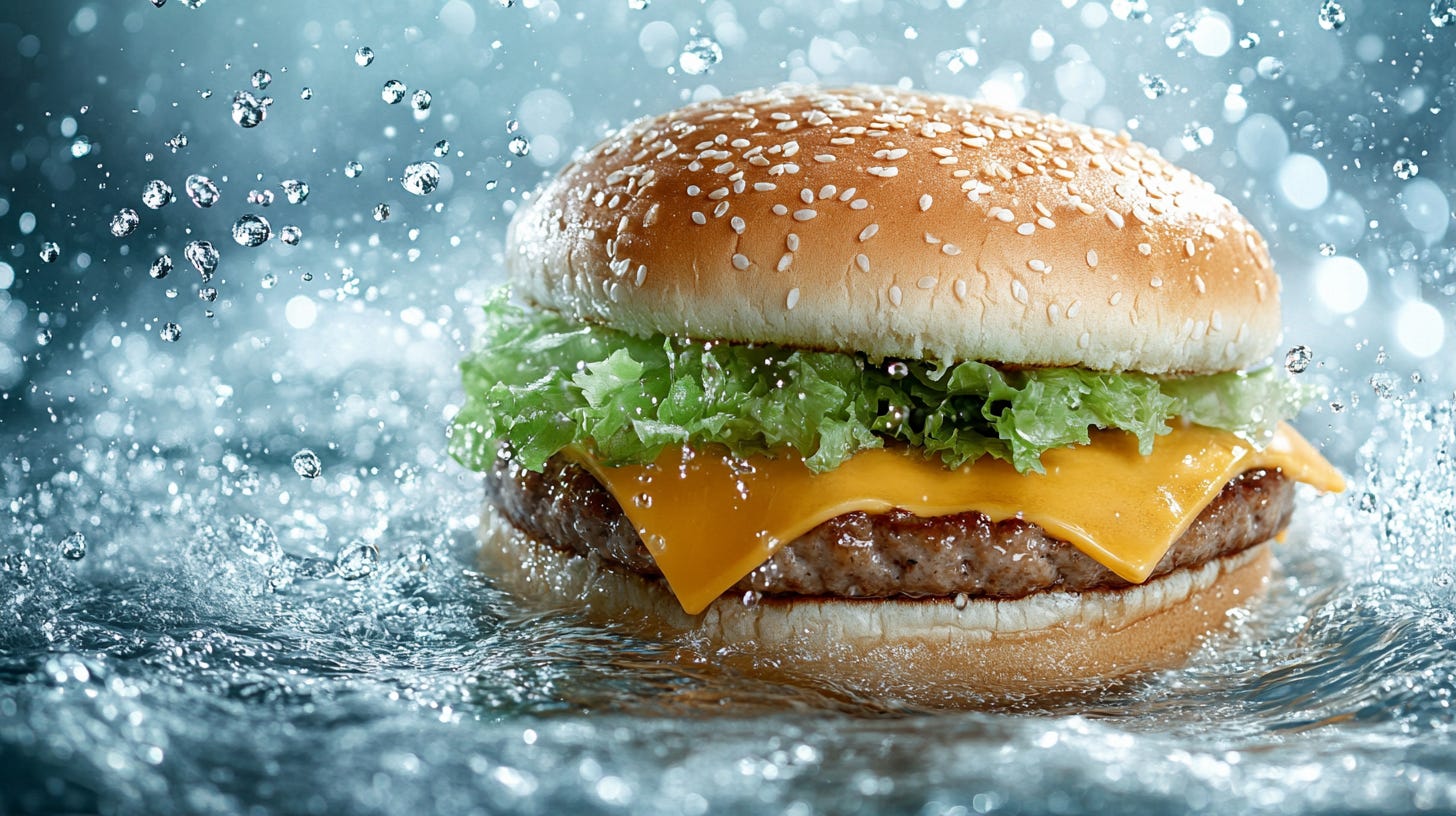The colossal benefits of cutting red meat
Creating one cheeseburger takes 950 gallons of water. There's a better way to Paleo.
I’m not here to badger you about eating red meat. I’m originally from cornfield country, Illinois, where meat was for breakfast, lunch and dinner and occasionally for dessert.
I’m here, rather, to tell you that reducing or eliminating red meat from your diet can set you free. Free from the burden of recycling, of trading your gas car for an EV, of turning off the bathroom faucet while you brush your teeth, or shave. Free from the guilt of taking that 30-minute shower with a low ball of Jameson after a really hard day.
That’s because producing red meat turns out to be so egregiously consumptive of fresh water and carbon-storing rainforest that eliminating just one steak or cheeseburger a month would do far more for Earth’s ecology than the combined impact of all our other green habits, from composting coffee grounds to flushing less often.
Cut red meat, help heal the planet.
To understand how, consider one of the best bands of the 80s: The Smiths.
Meat is Water
By naming its second album Meat is Murder, which rose to the top of the U.K. charts after its release in 1985, the band is said to have influenced thousands of people to ditch meat. Because producing a one half-pound cheeseburger requires 950 gallons of water — fairness requires pointing out that the cheese itself accounts for 38 gallons — it’s fair to say The Smiths helped save billions of gallons of water over the years.
By the way, this may be the first time anyone has quantified the environmental impact of The Smiths. Here’s the math underlying the above claim:
If we conservatively assume The Smiths, which sold more than a million copies of Meat is Murder, got just 2,000 people to stop eating only red meat, and we use a reasonable average per person annual consumption of 181 pounds of red meat, one pound of which requires 1,800 gallons of water to produce, the amount of water saved comes to 651.6 million gallons1 per year — almost two-thirds the way to a billion. If those 2,000 Smithian converts stuck with their no-meat diet for 4 years, that’s more than 2.6 billion gallons of water saved from red-meat abstinence alone.
Another way to frame red-meat’s colossal water consumption:
Producing one half-pound (raw-weight) cheeseburger consumes as much water as filling a bathtub 24 times, or taking 15 30-minute showers. (Or, for people with low-stress lives, 38 10-minute showers.) So if you cut down your cheeseburger consumption by just one per month, for instance, you could take 14 half-hour-long showers and still be saving about 75 gallons of fresh water.
Meat is Carbon
Cattle ranching is also the largest driver of global deforestation. Every half-pound cheeseburger razes about 60 square feet of rainforest and releases about 9 pounds of carbon into the Earth’s atmosphere, equivalent to driving your car 12 to 14 miles.
By comparison, a half-pound chicken sandwich with cheese requires about 294 gallons of water — less than a third the volume that an equivalent burger uses. Black beans require about one third as much water as beef to produce the same amount of protein. A half-pound fish sandwich uses less than 100 gallons.
A high-stress inflammation burger
I eat much less red meat (which technically includes pork, lamb, goat and mutton) now than I used to and certainly feel lighter and healthier for it.
From an aging with strength perspective, the health reasons for avoiding it are clear and present. One of them that doesn’t get enough attention is inflammation.
Considering how the distribution, quality and accessibility of global fresh water has changed — one-quarter of the world now faces extremely high water stress — reducing or cutting the water-guzzling red meat habit would be an admirable legacy to pass on to future generations and give you something in common with Morrissey and his bandmates.
I rely on Perplexity.ai to provide accurate math and sources to arrive at these figures. If I’m off the mark or led astray by crappy AI, I’m pretty sure
will let me know.





Well researched article (even if AI helped). Consider investigating melatonin as an anti inflammatory/anti aging agent. Not talking about the quantities used for sleeping, melatonin at high doses does much more than that. J Reiter and Doris Loh are top peer reviewed published researchers on this field, and they don't try to shill people (at least for now), unlike Sinclair. Yes it stops cancer, specially breast and prostate and Covid 19 as well. Sorry about the unrelated comment, but I agree 100% chronic inflammation is a driver for aging and plant based diets help with this.
Regarding Inflammation, Covid-19 is an inflammatory disease, as is Cancer and Heart disease. Vegans have been shown to have a lower incidence of all 3. When Vegans get Covid-19, it is less severe and shorter duration, less likely to result in hospitalization. I reference Dr. Michael Greger, NutritionFacts.Org.
Good article!